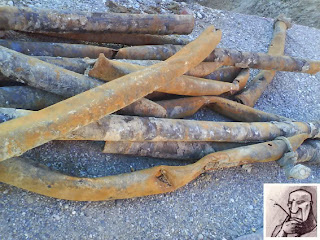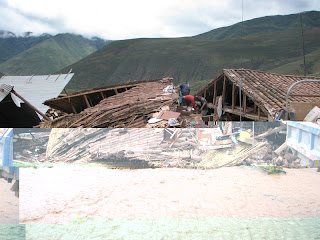There are many different kinds of climates on out planet.
Climates can be categorized by the average annual precipitation (wet vs.
dry) and by the average temperature (cold, temperate, and hot). These
categories lead to climates such as tundras, grasslands, deserts,
deciduous forests, boreal forests, and the tropics. Because of the
different temperatures and the different humidity, each of these areas
have a predominate form of weathering.
Wait. What is weathering?
Weathering is the break down of earth's rocks (rocks, minerals, crystals, mountain ranges, cliffs, and such) by the weather. It is the break down of rocks by air, the water in the air, and wind.
There are two basic different types of weathering.
Mechanical weathering
Mechanical weathering doesn't change the property of earth's rocks or mineral. If the rock was granite before, it is granite after weathered. It just gets smaller. This form of weathering has many causes.
Temperature changes cause expansion and contraction, thus creating cracks in rocks.
Water can freeze on a rock or inside a rock crack. When it freezes, the water expands, pushing the rock apart. The water melts and fills with even more water comes. It freezes again and expands even more.
Plants growing in rock cracks increase the size of the cracks as they grow.
Deflation. Air can pick up small pieces of sediment and move it to other areas.The wind-blown sediment slowly pounds away at the rock. The pounding of the rock with the sediment in the air is called abrasion.
Water can pound against rock, breaking off tiny pieces of rock.
Chemical weathering
Chemical weathering changes the composition of the rock or mineral. So, after chemical weathering MgSO4 is no longer MgSO4. The end product is different from the starting point. Like mechanical, chemical weathering has a variety of causes.
The air we breath is about 21% Oxygen. Oxygen from the air can combine with rocks, or replace an element in a mineral, to create a new rock or mineral.
Living things that grow on rocks often release acids that dissolve rock.
Water combines with particles in the air, like volcanic gases and industrial pollution to make acids. Acids dissolve rock and change the chemical composition of it. Outside sculptures are often weathered.
Chemical and mechanical weathering can operate together.
Chemical weathering can make physical weathering operate faster and physical weathering can make chemical weathering operate faster. Demonstrate this to yourself by performing this little experiment. Take three glasses. Put water in two of the glasses. Put candy in all three glasses. Label the glass without water "Control." Label the next glass "only chemical weathering." Label the third glass "chemical and physical weathering."Take the glass labeled chemical and physical weathering and swirl it for a minute. Let all the glasses sit. Come back in twenty minutes and notice which candies have dissolved more.While the candies in the "chemical only" glass have dissolved somewhat, the candies in the physical and chemical glass have dissolved much more.
Back to the climates
Different climates have predominate types of weathering.
Chemical weathering is faster when there is plenty of water. This is for two reasons. Firstly, the water combines with particles in the air to make acid. Secondly, more living things live in wet areas, and living things produce acids. Chemical weathering is also faster when it is warmer, because increased temperature speeds up chemical reactions.
Physical weathering, like water freezing in rock cracks, thawing, and re-freezing, requires cold temperatures to freeze, and it requires water to weather.
So, cold and wet favors mechanical weathering and hot and wet favors chemical weathering. The arctic tundra is cold and dry, so little chemical weathering occurs there. The rain forests, however, are hot and wet and chemical weathering does well there.
Wait. What is weathering?
Weathering is the break down of earth's rocks (rocks, minerals, crystals, mountain ranges, cliffs, and such) by the weather. It is the break down of rocks by air, the water in the air, and wind.
There are two basic different types of weathering.
Mechanical weathering
Mechanical weathering doesn't change the property of earth's rocks or mineral. If the rock was granite before, it is granite after weathered. It just gets smaller. This form of weathering has many causes.
Temperature changes cause expansion and contraction, thus creating cracks in rocks.
Water can freeze on a rock or inside a rock crack. When it freezes, the water expands, pushing the rock apart. The water melts and fills with even more water comes. It freezes again and expands even more.
Plants growing in rock cracks increase the size of the cracks as they grow.
Deflation. Air can pick up small pieces of sediment and move it to other areas.The wind-blown sediment slowly pounds away at the rock. The pounding of the rock with the sediment in the air is called abrasion.
Water can pound against rock, breaking off tiny pieces of rock.
Chemical weathering
Chemical weathering changes the composition of the rock or mineral. So, after chemical weathering MgSO4 is no longer MgSO4. The end product is different from the starting point. Like mechanical, chemical weathering has a variety of causes.
The air we breath is about 21% Oxygen. Oxygen from the air can combine with rocks, or replace an element in a mineral, to create a new rock or mineral.
Living things that grow on rocks often release acids that dissolve rock.
Water combines with particles in the air, like volcanic gases and industrial pollution to make acids. Acids dissolve rock and change the chemical composition of it. Outside sculptures are often weathered.
Chemical and mechanical weathering can operate together.
Chemical weathering can make physical weathering operate faster and physical weathering can make chemical weathering operate faster. Demonstrate this to yourself by performing this little experiment. Take three glasses. Put water in two of the glasses. Put candy in all three glasses. Label the glass without water "Control." Label the next glass "only chemical weathering." Label the third glass "chemical and physical weathering."Take the glass labeled chemical and physical weathering and swirl it for a minute. Let all the glasses sit. Come back in twenty minutes and notice which candies have dissolved more.While the candies in the "chemical only" glass have dissolved somewhat, the candies in the physical and chemical glass have dissolved much more.
Back to the climates
Different climates have predominate types of weathering.
Chemical weathering is faster when there is plenty of water. This is for two reasons. Firstly, the water combines with particles in the air to make acid. Secondly, more living things live in wet areas, and living things produce acids. Chemical weathering is also faster when it is warmer, because increased temperature speeds up chemical reactions.
Physical weathering, like water freezing in rock cracks, thawing, and re-freezing, requires cold temperatures to freeze, and it requires water to weather.
So, cold and wet favors mechanical weathering and hot and wet favors chemical weathering. The arctic tundra is cold and dry, so little chemical weathering occurs there. The rain forests, however, are hot and wet and chemical weathering does well there.
Gwen Nicodemus is a freelance engineer/writer and a homeschooling mom. Visit her website, Notion Nexus, for unit studies, worksheets, notes, and educational videos.



.jpg)

No comments:
Post a Comment